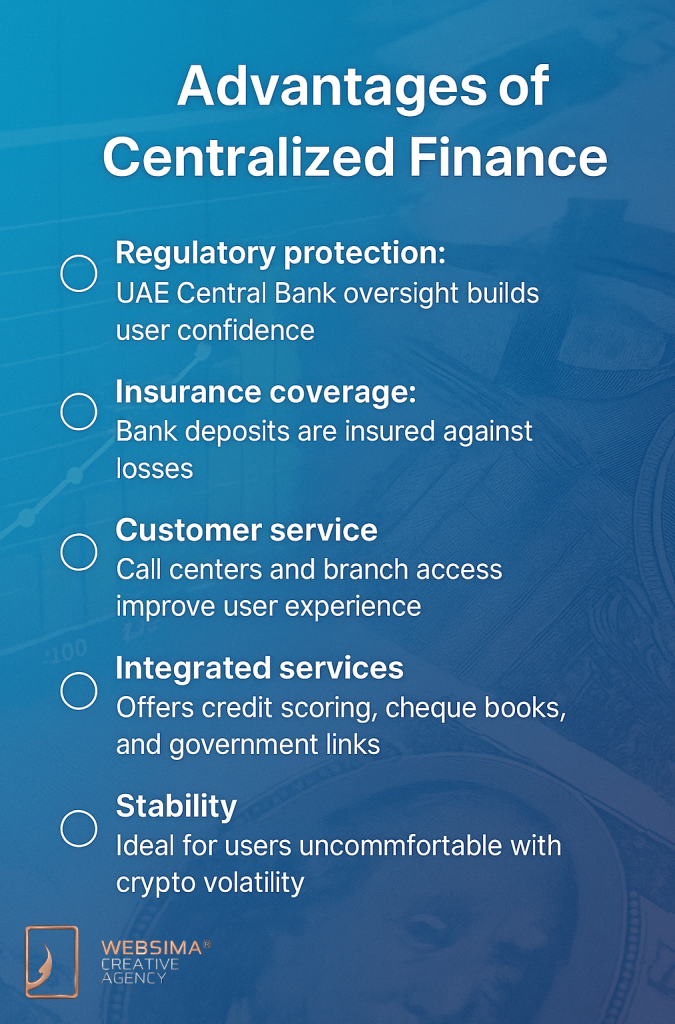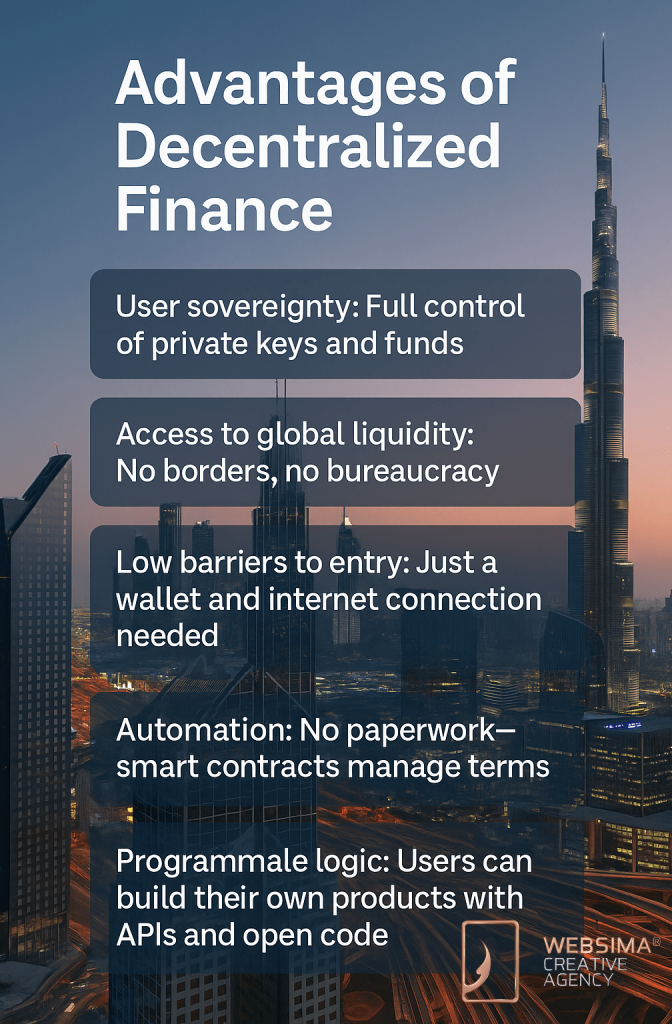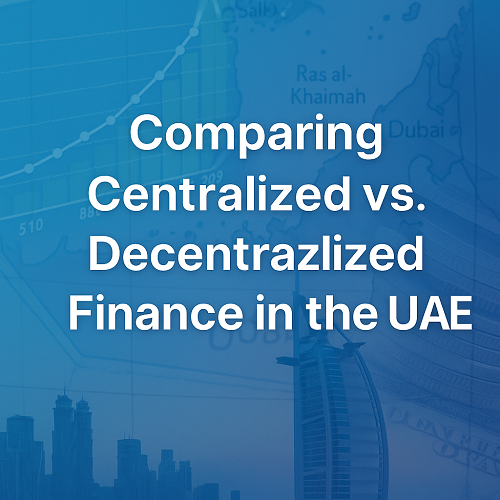Table of Contents
- Introduction: The Financial Evolution in the UAE
- What Is Centralized Finance (CeFi)?
- What Is Decentralized Finance (DeFi)?
- Core Differences Between CeFi and DeFi
- CeFi in the UAE: Traditional Foundations
- DeFi in the UAE: An Emerging Power
- Advantages of Centralized Finance
- Advantages of Decentralized Finance
- Key Risks in CeFi and DeFi
- Regulatory Developments in the UAE
- VARA and ADGM: Leading with Clarity
- Use Cases: CeFi vs DeFi in Real Life
- Hybrid Finance: The Future of Finance in the UAE
- International Comparisons and UAE’s Edge
- Conclusion: Navigating Both Worlds
- FAQs
- Work with Websima to Build CeFi & DeFi Solutions
Introduction: The Financial Evolution in the UAE
The UAE’s financial system is undergoing a historic transformation. Fueled by strong government initiatives, tech-savvy investors, and global blockchain momentum, the lines between traditional banking and decentralized finance are beginning to blur. Understanding opportunities and risks of DeFi and the difference between Centralized vs Decentralized finance in UAE is key to making informed decisions in a market that values both stability and innovation.
For entrepreneurs and businesses, the question is no longer whether to adopt digital finance but how to choose between CeFi and DeFi—or integrate both.
What Is Centralized Finance (CeFi)?
Centralized finance (CeFi) refers to the conventional financial system where banks, financial institutions, and government regulators mediate all transactions. In this model:
- User funds are stored in centralized accounts
- Transactions are processed via intermediaries
- Financial records are privately managed
- KYC and AML procedures are mandatory
Examples include:
- Bank savings and checking accounts
- SWIFT-based international transfers
- Credit card lending
- Personal and business loans via local banks
In the UAE, this model is led by top-tier institutions such as Emirates NBD, First Abu Dhabi Bank (FAB), and Mashreq Bank.
What Is Decentralized Finance (DeFi)?
#DeFi is reshaping financial freedom! Unlike traditional banks, decentralized finance lets YOU control your money—no middlemen, no hidden fees. Peer-to-peer lending, staking, and instant access from anywhere. This is the future of finance! #Crypto #Entrepreneur pic.twitter.com/aKZmTykvEz
— Junaid Dar (@JunaidDar85) March 20, 2025
Decentralized finance (DeFi) is a blockchain-based alternative where financial services run on public protocols without centralized control. It uses smart contracts to:
- Automate lending, borrowing, and trading
- Allow peer-to-peer interactions
- Enable non-custodial asset ownership
- Offer permissionless access to capital
DeFi platforms like Aave, Compound, and Uniswap are globally recognized. Locally, DeFi adoption in the UAE is growing through Dubai’s crypto regulatory push, fostering an ecosystem where startups and investors can build safely.
Core Differences Between CeFi and DeFi
| Criteria | Centralized Finance (CeFi) | Decentralized Finance (DeFi) |
| Control | Banks, regulators | Code, smart contracts |
| Accessibility | Limited to verified users | Open to anyone with a wallet |
| Custody | Bank-owned accounts | User-controlled wallets |
| Transparency | Closed systems | Fully auditable on-chain |
| Innovation Speed | Slow, regulated | Rapid and open-source |
| Customer Service | Bank help desks | Community/DAO support |
Both models serve unique roles in the evolving financial landscape of the UAE.
CeFi in the UAE: Traditional Foundations
CeFi remains dominant in the UAE, supported by:
- Established banking infrastructure
- Access to regulated mortgages and investment products
- Government backing and deposit insurance
- Tried-and-tested risk management systems
Banks such as ADCB, RAKBANK, and ENBD offer robust mobile banking solutions, corporate finance, and Sharia-compliant lending. CeFi is especially critical for real estate purchases, large-scale commercial investments, and conventional retail services.
DeFi in the UAE: An Emerging Power
The UAE is one of the few countries actively developing pro-DeFi regulatory frameworks, making it a regional leader. Key initiatives include:
- VARA in Dubai: Regulates all virtual assets, including DeFi platforms
- ADGM Digital Lab: Provides a fintech sandbox for blockchain projects
- DMCC Crypto Centre: Licenses DeFi firms, wallets, and DAOs
Dubai’s approach allows DeFi startups to experiment legally within regulatory sandboxes, encouraging safer, scalable innovation.
Advantages of Centralized Finance

- Regulatory protection: UAE Central Bank oversight builds user confidence
- Insurance coverage: Bank deposits are insured against losses
- Customer service: Call centers and branch access improve user experience
- Integrated services: Offers credit scoring, cheque books, and government links
- Stability: Ideal for users uncomfortable with crypto volatility
Advantages of Decentralized Finance

- User sovereignty: Full control of private keys and funds
- Access to global liquidity: No borders, no bureaucracy
- Low barriers to entry: Just a wallet and internet connection needed
- Automation: No paperwork—smart contracts manage terms
- Programmable logic: Users can build their own products with APIs and open code
DeFi is ideal for Dubai’s tech entrepreneurs, Web3 developers, and digital-native investors.
Key Risks in CeFi and DeFi
CeFi Risks:
- Lack of transparency in bank investments
- Limited access for the unbanked or foreign nationals
- Centralized data breaches
- Dependency on intermediaries
DeFi Risks:
- Smart contract bugs or exploits
- No user support or recourse
- Volatility of tokens and platforms
- Regulatory uncertainty (if unlicensed)
Dubai’s approach is to mitigate both risk types via strong policy design.
Regulatory Developments in the UAE
In 2022–2024, the UAE introduced multiple frameworks to regulate both CeFi and DeFi:
- SCA Crypto Asset Regulation (national scope)
- VARA’s Full Market Product Rulebook
- ADGM’s Regulatory Framework for DLT and Digital Assets
By 2025, firms offering DeFi services like staking, lending, and tokenization must register with VARA or ADGM to operate legally.
VARA and ADGM: Leading with Clarity
- VARA (Dubai): Issues licenses for custodians, DEXs, DeFi platforms, and NFT utilities. Operates under Dubai World Trade Centre Authority.
- ADGM (Abu Dhabi): Provides a sandbox for regulated DeFi testing under its RegLab structure. Focuses on fintech, RegTech, and DeFi compliance.
These bodies help SMEs and fintechs launch tokenized, compliant financial products with confidence.
Use Cases: CeFi vs DeFi in Real Life
| Use Case | CeFi Model | DeFi Model |
| Personal loans | Emirates NBD loan with interest | Aave lending pool with crypto collateral |
| International payments | SWIFT via FAB or RAKBANK | USDT/USDC via blockchain |
| Real estate investment | Mortgage via ADCB | Tokenized fractional property via smart contract |
| Business credit | SME lending via Mashreq NeoBiz | Peer lending via DAO platform |
| Savings | Bank deposit with interest | Staking on a DeFi yield protocol |
Hybrid Finance: The Future of Finance in the UAE
Hybrid finance, or “CeDeFi”, combines the best of both worlds:
- Binance’s CeDeFi model is a global benchmark
- UAE banks are exploring tokenized bond issuance
- Central Bank Digital Currency (CBDC) pilots could embed DeFi logic into fiat systems
Expect to see more banks offering DeFi APIs, and DeFi projects integrating with compliance tools by 2026.
International Comparisons and UAE’s Edge
While the US and EU are tightening DeFi regulation, the UAE is creating pathways for safe innovation.
Advantages the UAE offers:
- Dedicated crypto regulators (VARA)
- Free zones for DeFi experimentation (DMCC, ADGM)
- No corporate tax on many digital asset businesses
- Proximity to MENA and Asian markets
- Global events like TOKEN2049 and Future Blockchain Summit
These elements make the UAE a strategic base for launching regulated, innovative financial models.
Conclusion: Navigating Both Worlds
The UAE is creating a financial future where CeFi and DeFi coexist, collaborate, and evolve. For entrepreneurs, considering that there are already top DeFi startups in the UAE, however, it’s not about choosing one over the other—it’s about building hybrid models that:
- Protect users
- Unlock global liquidity
- Enable programmable, compliant innovation
Understanding Centralized vs Decentralized finance in UAE is now a strategic business requirement.
FAQs
Is it legal to use DeFi in the UAE?
Yes, if done through a licensed provider under VARA or ADGM.
Can SMEs use both CeFi and DeFi together?
Absolutely. Many businesses accept bank transfers and stablecoins, use DeFi for treasury management, and rely on CeFi for fiat settlements.
Do I need a license to launch a DeFi protocol in Dubai?
Yes. VARA requires registration for any virtual asset service providers operating in or targeting the Dubai market.
Work with Websima to Build CeFi & DeFi Solutions
At Websima, we build custom blockchain and Web3 solutions that bridge CeFi and DeFi—designed for Dubai’s regulatory landscape and international scalability.
Our services include:
- Smart contract development & auditing
- DeFi protocol architecture (DEXs, staking, lending)
- CeFi app integration (wallets, identity, fiat gateways)
- UI/UX for financial dashboards and investor portals
- Legal compliance consulting with VARA and ADGM partners
Ready to lead the future of finance in the UAE?
Contact Websima today to build secure, compliant, and scalable CeFi or DeFi products from the heart of Dubai.





